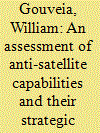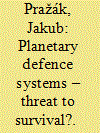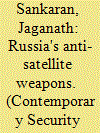| Srl | Item |
| 1 |
ID:
064770


|
|
|
| 2 |
ID:
181878


|
|
|
|
|
| Summary/Abstract |
The article explains why Weaponisation of outer space may soon be inevitable and that development of space weapons is a serious issue, especially in regard to dealing with sensitive dual-use technology. At the same time, the Earth may be threatened by incoming asteroids and comets, which may endanger humankind’s existence. Hence, it is advisable to develop effective planetary defence systems. However, the article claims that discussed planetary defence technology – kinetic impactor, nuclear explosion, gravity tractor and space tug, laser, and solar collector – have far-reaching dual-use consequences with potential for their weaponisation. Thus, the article argues in favour of greater transparency and surveillance mechanisms for dual-use and arms control. Moreover, the private sector should be involved in discussion since it may be contributing to negotiation processes and can ensure secure research and development, as well as operability of sensitive planetary defence systems.
|
|
|
|
|
|
|
|
|
|
|
|
|
|
|
|
| 3 |
ID:
186555


|
|
|
|
|
| Summary/Abstract |
Russia has recently tested several anti-satellite weapons. The Russian military literature reveals hedging and offsetting strategies behind these actions. First, Russians cast their weapons as a mirror response to American experiments. Russians fear a technological surprise and suggest that their experimentation hedges against significant advantages that may accrue to the United States from dominating space. Second, Russians perceive satellites providing vital targeting and navigation information as crucial enablers of U.S. and NATO aerospace precision strike weapons. Therefore, dependence on space-based assets is a vulnerability that Russia cannot fail to take advantage of in a crisis to offset U.S. and NATO military superiority. Some unilateral measures such as deploying cheaper and distributed small satellite constellations can reduce U.S. and allied vulnerabilities. Bilateral behavioral norms can offer reassurances to both the United States and Russia. However, deeper regulation and limits on emerging strategic aerospace weaponry may also be required.
|
|
|
|
|
|
|
|
|
|
|
|
|
|
|
|